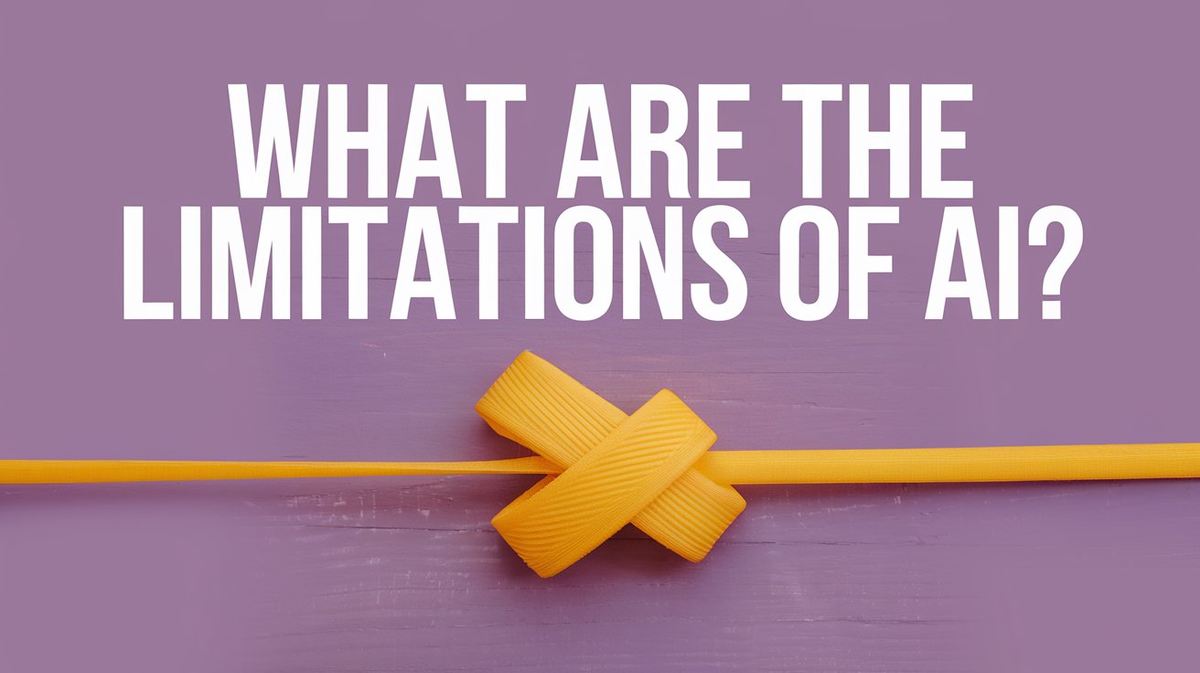Table of Contents
Are you curious about the limits of AI or perhaps a bit sceptical about its seemingly endless potential?
From technical glitches to ethical dilemmas, AI faces several hurdles that aren't just theoretical, they're affecting real-life decisions and policies. By understanding these limitations, you can better appreciate the complex dynamics shaping the technological landscape. Stay informed, and you'll see where AI can genuinely excel and where the brakes might just need pressing.

Technical Limitations of AI
As artificial intelligence develops, it struggles with technical constraints that hold back its potential. These limitations stem from how AI systems are designed and interact with the data and environments they are presented with. Here we explore some of the key technical challenges preventing AI systems from achieving flawless performance.
Data Dependency
At the heart of AI's learning capability is data, but what happens when the data isn't up to scratch? AI heavily relies on the quality and availability of data to learn and make decisions effectively. If the data used for training is flawed, biased, incomplete or low quality, you can be sure the AI's decisions and output will be subpar too.
Algorithmic Bias
Ever noticed how AI responses in ChatGPT can sometimes seem a bit...partial? That's algorithmic bias for you. AI tends to inherit the biases present in its training data, leading to skewed outcomes that can affect fairness and accuracy. Consider a hiring algorithm trained on past employee data skewed towards one demographic. What happens? It perpetuates those biases in it’s output, potentially eliminating equally qualified candidates from the recruitment process. As AI becomes more embedded in critical decision-making systems, addressing and mitigating these biases is more crucial than ever.
Lack of Common Sense Reasoning
While AI may excel in pattern recognition and data processing, it significantly lacks what we humans often take for granted, common sense. AI may master chess or solve complex equations, but it struggles with basic common sense reasoning that would be easy for a child to grasp. It lacks the innate understanding of real-world experiences and social expectations. This limitation makes it challenging for AI to navigate tasks requiring emotional intelligence and a broader human-like understanding of the world.
Limited Understanding of Context
AI often stumbles in understanding complex contexts. Whether it's interpreting sarcasm or understanding cultural tendencies, AI's capability to decode context is limited. When language and decisions heavily rely on context, like in negotiations or emotional conversations, AI often misses the mark. This shortcoming means AI can misinterpret commands or give inappropriate responses, making its application tricky in situations that require a deeper understanding of human communication norms.
Ethical Limitations of AI
Artificial intelligence offers vast potential, yet it also brings ethical dilemmas that we must address head-on. So, what is ethical AI? , challenges range from privacy infringement to redefining job landscapes, requiring thoughtful consideration of how technology shapes our future.
Privacy Concerns
AI thrives on data, but its data-hungry nature often clashes with individual privacy rights. With AI systems collecting vast amounts of personal information, there's a growing worry about how this data is used and stored. Imagine AI-powered devices in homes or smart assistants on phones, constantly gathering data to "improve" user experience. Yet, what happens when this information falls into the wrong hands or is used for purposes beyond its original intent?
AI operators must strike a balance by implementing safeguards to uphold user privacy while still functioning effectively. The trust between consumers and AI systems relies on transparent data practices. Without it, users may feel like they're under constant surveillance, sacrificing their privacy for convenience.

Accountability Issues
When AI makes a decision, who is held accountable? Accountability is one of the issues of AI. If an AI system causes harm or makes a mistake, identifying who is responsible can be a tricky process. Is it the developer, the company deploying the system, or the AI itself?
Unclear accountability can lead to both legal and ethical dilemmas. In situations where AI decisions have significant consequences, like hiring employees, autonomous vehicles or diagnostic tools; understanding who answers when things go wrong becomes crucial. Explore how Real Estate professionals are approaching compliance in our article on navigating the EU AI Act. Society must determine frameworks for responsibility in AI decisions, ensuring clear lines of accountability as technology evolves.
Job Displacement Risks
Automation and AI are revolutionising work as we know it, but not without repercussions. As AI systems become more capable, they often replace human roles, sparking fears of job loss across various sectors. While automation can increase efficiency, it raises ethical questions about the future of employment.
What happens to those whose jobs are made redundant? How do we support individuals transitioning to new roles in an AI-driven world? These questions highlight the need for policies that address workforce transformations. Preparing workers for shifts in employment and ensuring access to upskilling opportunities are vital steps in navigating AI's impact on jobs.
The ethical considerations surrounding AI demand careful navigation. By understanding these challenges, society can foster technological advancements that empower rather than displace, protect rather than infringe, and assign accountability clearly and fairly.
Social Limitations of AI
Artificial intelligence has surged forward with mind-boggling advancements, yet social factors continue to pose significant roadblocks. These limitations are not rooted in technology itself but instead stem from societal perspectives and access inequities, which can dampen the broader acceptance and utilisation of AI.
Public Perception and Trust
AI has often been met with suspicion and worry, casting shadows over its growth. Why is there a lack of trust in AI? It's partly because many associate AI with job losses, privacy invasion, or even dystopian futures depicted in films. This scepticism can hinder AI's implementation and development, as public fear translates into resistance against adopting new technologies.
When AI systems make decisions that impact livelihoods, such as in hiring processes or credit scoring, the distrust grows. People are wary of relinquishing control to machines perceived as lacking empathy or fairness. Building trust demands transparency and clear explanations of how AI algorithms work and how they make decisions. Educating the public on AI’s capabilities and limits, while ensuring accountability and fairness, is crucial for overcoming these hurdles.
Digital Divide
The digital divide represents a significant barrier, with unequal access to technology limiting AI's advantages across different segments of society. While some people benefit from high-speed Wi-Fi and the latest devices, others are unable to reap the benefits that AI promises in fields like housing, healthcare, education, or employment.
To bridge this divide, digital literacy programmes and affordable access must be prioritised. Governments and organisations need to collaborate to break down these barriers, ensuring everyone can harness the power of AI for meaningful advancements in their lives.
Conclusion
AI offers immense potential, but its limitations are significant and must be recognised and addressed for it to achieve further advancements. The technical issues, such as data dependency and lack of context understanding, can slow down AI's advancement. Ethically, AI presents privacy concerns and job displacement risks that need careful managing. Socially, public perception and the digital divide highlight ongoing obstacles.
These challenges encompass the importance of respecting privacy, ensuring fairness, and encouraging digital inclusivity. We must engage with these issues critically to ensure AI benefits everyone and continues to evolve in a positive trajectory. Are we ready to face these challenges head-on? The future of AI depends on how we tackle these crucial questions.
TL;DR
What are the Limitations of AI?
- AI heavily relies on the quality and availability of data
- AI tends to inherit the biases present in its training data
- AI struggles with basic common sense reasoning that would be easy for a child to grasp
- AI often stumbles in understanding complex contexts
- Its data-hungry nature often clashes with individual privacy rights
- Unequal access to technology limits AI's advantages across different segments of society


